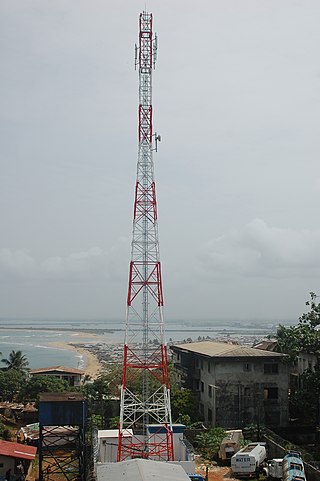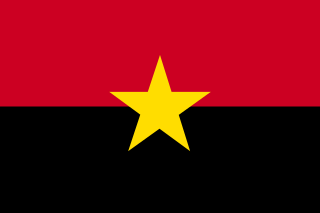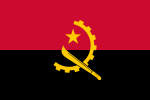
Angola, officially the Republic of Angola, is a country on the west-central coast of Southern Africa. It is the second-largest Lusophone (Portuguese-speaking) country in both total area and population and is the seventh-largest country in Africa. It is bordered by Namibia to the south, the Democratic Republic of the Congo to the north, Zambia to the east, and the Atlantic Ocean to the west. Angola has an exclave province, the province of Cabinda, that borders the Republic of the Congo and the Democratic Republic of the Congo. The capital and most populous city is Luanda.

Mass media in Liberia include the press, radio, television, fixed and mobile telephones, and the Internet.

The People's Movement for the Liberation of Angola, for some years called the People's Movement for the Liberation of Angola – Labour Party, is an Angolan social democratic political party. The MPLA fought against the Portuguese Army in the Angolan War of Independence from 1961 to 1974, and defeated the National Union for the Total Independence of Angola (UNITA) and the National Liberation Front of Angola (FNLA) in the Angolan Civil War. The party has ruled Angola since the country's independence from Portugal in 1975, being the de facto government throughout the civil war and continuing to rule afterwards.

Jornal de Notícias is a Portuguese daily national newspaper, one of the oldest in Portugal.
Stélvio Rosa da Cruz, known simply as Stélvio, is an Angolan professional footballer who plays for Luxembourg club FC Mondercange as a defensive midfielder.

The People's Armed Forces of Liberation of Angola or FAPLA was originally the armed wing of the People's Movement for the Liberation of Angola (MPLA) but later (1975–1991) became Angola's official armed forces when the MPLA took control of the government.

The following outline is provided as an overview of and topical guide to Angola:

Mass media in Cape Verde includes aspects of telecommunications, television and radio.

Televisão Pública de Angola E.P. or TPA is the national broadcaster of the Southern African state of Angola. It operates two generalist television channels and a news channel. TPA is headquartered in the capital city Luanda and broadcasts in the Portuguese language.
The mass media in Mauritius is limited by its small population size. Nonetheless, Mauritius has a robust economy, and there are a number of major media outlets, including print newspapers, radio and television stations.
The mass media in Mauritania is undergoing a shift into a freer journalistic environment, while becoming increasingly open to private sector.
Mass media in the Republic of the Congo are severely restricted by many factors, including widespread illiteracy and economic underdevelopment.
The following is a timeline of the history of the city of Luanda, Angola.

Palanca TV was an Angolan private TV station that began broadcasting on December 15, 2015. The channel was available for Angolan subscribers through South African satellite service provider DStv.
Mass media in Togo includes radio, television, and online and print formats. The Agence Togolaise de Presse news agency began in 1975. The Union des Journalistes Independants du Togo press association is headquartered in Lomé.
Mass media in Guinea-Bissau includes print, radio, television, and the Internet. "The Conselho Nacional de Comunicação Social regulates the press." The government-run Guinea-Bissau National Radio began in 1973 and Guinea-Bissau Television began in 1987.
Mass media in Namibia includes radio, television, and online and print formats.







